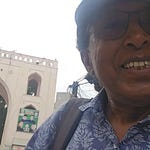last week, while on the road again, I had the privilege of attending a thought-provoking event organized by Dr. Abdi Wahid of MAQASID CONSULTING Pty Ltd in Melbourne. Held on Saturday, 18 January 2025, at the Djerring Flemington Hub, the event, titled Exploring the Link Between Economic and Political Instability in Somalia, brought together experts, scholars, and members of the Somali diaspora. It focused on addressing Somalia's enduring challenges since the collapse of its central government in 1991, exploring the intricate interplay between political stagnation and economic struggles, and highlighting emerging opportunities in agriculture, technology, and fisheries as pathways to recovery and progress.
I contributed to the event through a pre-recorded presentation (see below), which offered an overarching perspective and is accessible on YouTube. While I would have preferred to attend in person and actively engage with the participants, my current commitments in Borame1 have taken precedence. This week, I am focusing on the education sector, including meetings with the management team of Amoud University. Further insights on these engagements will be shared in next week’s post.
Event Highlights and Key Insights
The gathering brought together prominent experts, policymakers, and members of the Somali diaspora to discuss Somalia's complex challenges and the emerging opportunities that offer hope for recovery.
The event shed light on the nation's journey since the collapse of its central government in 1991, a period marked by political stagnation, infrastructure destruction, and diminished investor confidence. However, optimism emerged through discussions of opportunities in agriculture, technology, and fisheries, bolstered by the Somali diaspora's contributions to rebuilding efforts.
Speakers and their Contributions
The event featured an esteemed lineup of speakers, each offering unique perspectives on Somalia’s socio-economic and political landscape:
Farah Ali Shire, a seasoned Somali politician and former Minister of Finance (2009–2014), shared insights from his extensive experience in governance and economic reforms in Puntland State.
Ahmed Mohamed Nur Koshin, an economist with over 40 years of experience across public and private sectors, emphasized the importance of financial accountability and anti-money laundering frameworks in fostering economic stability.
Ibrahim Hassan, the State Manager of MCCA, highlighted the critical role of technology and strategic IT growth in Somalia's development.
Dr. Mohamed Abbas Omar, a former State Minister of Puntland, presented a diplomatic perspective, discussing the role of international relations in Puntland’s development initiatives.
Mohamed Ibrahim, Researcher at Swinburne University and former Somali Minister of Posts and Telecommunications, focused on Somalia's integration into the global digital economy. .
Mohamed Ibrahim, participated via a pre-recorded presentation. On the road during the event, he shared his reflections on the interplay between economic and political challenges in Somalia, emphasizing the need for a coherent strategy to leverage Somalia's untapped potential in agriculture and technology. His address provided a unique consultancy-driven perspective, bridging theory and actionable solutions.
Event Significance
The discussions provided a roadmap for Somalia’s recovery, highlighting the diaspora’s critical role in advancing economic initiatives, promoting governance reforms, and rebuilding trust in institutions. The event also underscored the need for collaborative efforts between local and global stakeholders to ensure sustainable development.
As the Somali community continues to navigate the challenges of economic and political instability, events like this serve as a platform for informed dialogue and actionable strategies. The insights shared promise to inspire ongoing efforts to rebuild Somalia’s future.
I acknowledge your input and will focus on writing and analyzing the evolving dynamics of the cryptocurrency industry, which has garnered significant attention and become a prominent topic of discussion since the election of Donald Trump. As always, your comments and feedback are welcome and encouraged.
Amoud, located in the Awdal region of Somaliland, holds a significant place in Somali history, both as a site of colonial encounters and as a center for modern education. During the colonial period, Amoud, like much of Somaliland, came under British administration following the establishment of the British Somaliland Protectorate in the late 19th century. This period saw the imposition of colonial governance structures and the exploitation of local resources, which disrupted traditional systems and created enduring socio-political challenges.
Post-independence, Somaliland experienced periods of political instability, culminating in the civil war of the late 20th century. However, Amoud emerged as a beacon of resilience and progress in the aftermath of these conflicts. In 1998, Amoud University was established as the first institution of higher education in Somaliland. Founded through community efforts, the university was part of broader grassroots initiatives to rebuild the region's educational and institutional frameworks following the devastation of the civil war.
Amoud University has since become a model for educational development in Somaliland and the Horn of Africa. It offers programs in various disciplines, including medicine, agriculture, and social sciences, and contributes significantly to the region's socio-economic development. Its establishment marked a pivotal shift in post-conflict reconstruction, emphasizing the role of education in fostering stability and growth in Somaliland.













Share this post